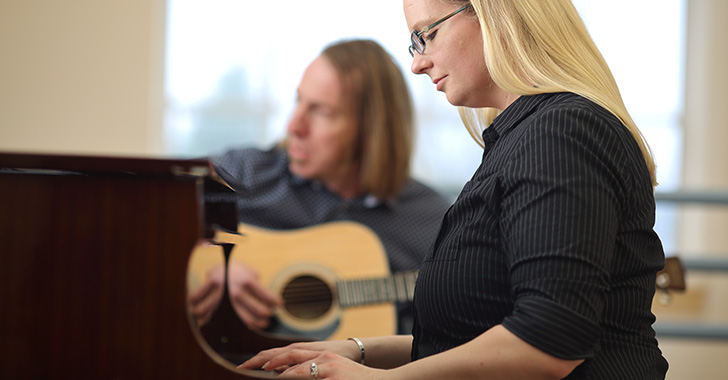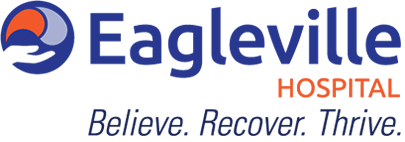Addiction Programs

Across all programs for addiction treatment at Eagleville, we believe that each person can achieve recovery and thrive in it. Patients may enter treatment with a call to our admissions office or through direct referral from another hospital or outpatient counseling program.
Medical Detoxification.
This short-stay, medically supervised program is frequently the first step for most patients. The goal of detoxification is two-fold: to ensure a safe and comfortable physical withdrawal from substances and, for this chronic, life-threatening disorder, to motivate the person to seek further treatment at Eagleville or elsewhere. This stage of treatment generally lasts 3 to 5 days.
Rehabilitation.
Inpatient treatment is designed to provide a healing environment for continued assessment, individual and group therapy, and recovery education. This step follows detoxification for many patients. Psychiatric or psychological evaluation and medication management may also become an essential part of rehabilitation for patients with a history of psychiatric treatment or a mental health disorder. In this environment, we strive to prepare each patient for recovery by helping the patient develop skills, learn to use recovery tools, and understand what resources are available in pursuit of recovery. On average, patients remain in rehabilitation for a period of two to three weeks. For some, the maximum stay may approach 60- 90 days, depending upon the severity of addiction, treatment history, and the assessment of the treatment team.
Which Program Is for Me?
All admissions to addiction programs are voluntary. Many admissions are scheduled the same day the patient is referred to or contacts Eagleville. When a patient arrives at Eagleville, we review the patient’s medical history and perform a physical examination before recommending a program, or level of care. This includes a determination of whether detoxification is necessary.
Medical Detoxification Programs
Hospital Level Detoxification – Detoxification for Those Requiring Intensive Care
For patients who need detoxification and have a history of serious medical issues or other health conditions, Eagleville offers a setting with medical supervision and round-the-clock nursing attention. Patients in this program may be pregnant or living with a chronic medical condition, such as diabetes, hypertension, cardiac disease, or chronic pain, and may also be struggling with mental health disorders. The length of stay averages five days.
Residential Level Detoxification – Detoxification for Those Requiring Less Intensive Care
Based upon medical screening, a person in need of detoxification without major medical or psychiatric problems may be admitted to a residential setting with medical oversight and psychological work-up, if needed. Here the length of stay is an average of three to five days.
Rehabilitation Programs
Hospital Level Rehabilitation – Rehabilitation for Those Requiring Intensive Care
Similar to the hospital detoxification program, Eagleville provides a short-stay, hospital-level rehabilitation program for patients in need of addiction counseling, physician oversight, and 24-hour nursing. Patients in this program may be living with a chronic medical condition, such as diabetes, hypertension, cardiac disease, or chronic pain. Patients in this program may also be in need of psychiatric evaluation and management of psychotropic medications.
A stay typically lasts 10 to 14 days, depending on patient needs and recommended treatment.
Residential Rehabilitation for Co-Occurring Disorders – Rehabilitation for Those with Mental Health Disorders
Eagleville recognizes the special needs of persons who have a history of alcohol or drug use along with a mental health disorder by providing a program for the residential treatment of this “co-occurring” situation. Patients in this program receive addiction treatment coupled with psychiatric evaluation and medication management to deal with a spectrum of mental health disorders, for example depression, bi-polar, and anxiety disorders.
Patients admitted to this program may require longer stays, up to 90 days, depending upon need and the severity of symptoms. Patients may also be evaluated for Medication Assisted Treatment during this program.
Residential Rehabilitation – General Rehabilitation for Those with Substance Use Disorders
Following detoxification, many patients remain in inpatient treatment for purposes of rehabilitation. This could be for a short period of two to three weeks or a longer term up to 90 days depending upon the severity of addiction, treatment history, and the assessment of the treatment team. While in this program, medical, psychiatric and nursing services may be offered upon consultation. Medication Assisted Treatment may be made available or recommended.
What to Expect in the Addiction Programs?
Daily Programming, Counseling Options, and Recovery Services
We approach each patient holistically and consider all options and services that can assist the patient in therapy. Our treatment programs consist of daily community meetings, group therapy, and a host of educational sessions on addiction and drug free living. Each patient is assigned a primary therapist for individual and small group therapy sessions, and a case manager to assist with aftercare planning.
Specific daily programming will be based on each person’s treatment needs, and access to resources and activities is available according to personal choices. Some programs and activities are gender specific.
Besides individual and small group therapy sessions, examples of treatments and services include:
- Education on recovery and mental health, in seminar sessions or the individual or small group therapy sessions
- Adjunctive Therapy, e.g., art studio, recreational therapy, G.E.D. test preparation classes, music group, and tending plants in our greenhouse
- Holistic wellness groups, e.g., yoga and meditation
- Referral groups, e.g., art therapy, life skills classes, anger management classes, and parenting classes
- 12-step meetings (NA, AA, CA) and recovery education
- Personal development activities such as Interactive Journaling
- Access to the People Empowering and Engaging in Recovery (PEER) Center for access to a computer lab and other aftercare planning resources
- Family sessions and family education
Therapy methods include using innovative, evidence-based practices such as Motivational Interviewing, Thinking For a Change, Interactive Journaling (a Change Companies curriculum), Trauma Informed Care, Transtheoretical Model of Change, and Cognitive Behavioral Therapy. Furthermore, the Parenting and Life Skills classes utilize the Hazelden’s Living Skills Program.
Treatment Team
A highly trained, multidisciplinary team is available to provide care to each of our patients. Medical, psychiatric, and nursing staff provide medical and psychiatric care as needed. Clinical coordinators, social workers, therapists, and case managers provide daily programming and counseling expertise. Case managers or social workers and therapists also work with the patient to develop individualized treatment plans and aftercare plans. Adjunctive therapists coordinate recreational and therapeutic activities that can enhance a patient’s well-being. The team also includes Certified Peer Specialists (CPS), who are individuals living successfully in recovery, sharing a common lived-experience with the patient, and who can be vital in providing guidance and support to patients along their journeys.
Treatment Planning
Throughout treatment, therapists and case managers work with each patient to prepare an achievable treatment plan individualized to that patient. Substance use history, significant medical issues, mental health disorders, criminal justice involvement, or other socioeconomic challenges are considered when developing the plan. This ensures that all issues can be treated concurrently. We review the treatment plan and update it as treatment changes and progresses.
Aftercare Planning
From the beginning in each program, our case managers or social workers assist each patient in developing unique and comprehensive aftercare plans individualized and tailored to the patient’s needs.
In the case of completing a detoxification program, this plan could include remaining at Eagleville Hospital in a rehabilitation program. When the patient leaves Eagleville, either after detoxification or rehabilitation, this plan focuses on finding the right supports within the community that can help the patient sustain recovery and that the patient can turn to in times of crisis. Such a plan could include making appointments for medical or psychiatric treatment, finding safe and sober housing, locating peer groups a patient can relate to, identifying a 12-step or other recovery based program, or making referrals to Certified Recovery Specialists.
After leaving Eagleville, patients will have access to their medical records, either electronically or by contacting our Medical Records Department.
